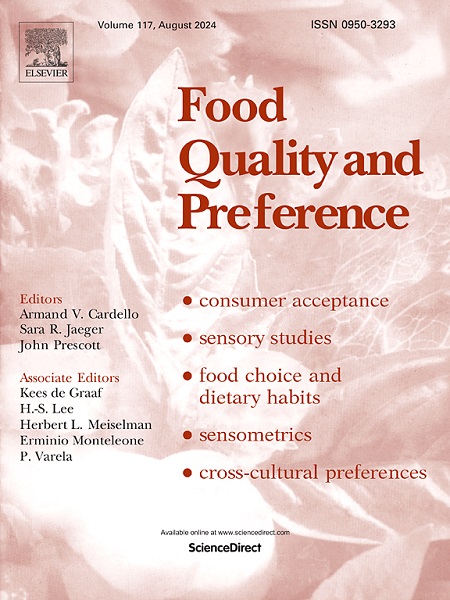The effect of stealth vs. declared reductions to lunch meal portion size on subsequent energy intake: A randomised control experiment.
IF 4.9
1区 农林科学
Q1 FOOD SCIENCE & TECHNOLOGY
引用次数: 0
Abstract
Large reductions to meal portion size result in reduced daily energy intake due to reductions not being fully compensated for through later energy intake. However, to date no studies have investigated how relatively small portion size reductions (15 %) affect daily energy intake. The present study investigated whether reducing the portion size of a meal by 15 % affects subsequent intake and if this effect differs depending on awareness of the portion size reduction. Participants (N = 110) attended two test days where they were given ad libitum access to a lunch meal and a dinner meal. Portion size of the lunch main course on the second test day was either the same as the amount they had consumed on the test first day (control condition), or 15 % less. Participants served 15 % less were either told that the portion size was the amount they consumed on the previous test day (reduced unaware condition) or it had been reduced (reduced aware condition). Findings revealed that lunch main course intake on the second day was lower in both of the reduced portion size conditions than the control condition. Both immediate and later subsequent intake post-lunch main course did not differ between groups, indicating a lack of evidence for compensatory eating in response to reduced portion size. However, exploratory analyses suggested that participants in the reduced aware condition showed some degree of compensatory eating. These findings suggest that reducing meal portion size by 15 % decreases meal intake and may not cause significant later compensatory eating.
Trial registration: This trial was registered at www.clinicaltrials.gov as NCT06119295
对随后的能量摄入隐形vs宣布减少午餐份量的影响:一个随机对照实验。
大量减少膳食份量导致每日能量摄入减少,因为减少的能量没有通过以后的能量摄入得到充分补偿。然而,到目前为止,还没有研究调查相对较小的份量减少(15%)如何影响每日能量摄入。目前的研究调查了将一餐的份量减少15%是否会影响随后的摄入量,以及这种影响是否会因人们对减少份量的认识而有所不同。参与者(N = 110)参加了两天的测试,他们可以随意享用午餐和晚餐。在第二个测试日的午餐主菜的份量要么与他们在测试第一天消耗的量相同(对照条件),要么少15%。参与者少吃了15%,要么被告知份量是他们在前一个测试日吃的量(减少不知情条件),要么被告知份量已经减少了(减少不知情条件)。研究结果显示,在减少份量的两种情况下,第二天的午餐主菜摄入量都低于对照组。两组之间午餐后主菜的即时摄入量和随后的摄入量没有差异,这表明缺乏证据表明补偿性饮食对减少份量的反应。然而,探索性分析表明,在意识降低的情况下,参与者表现出一定程度的补偿性进食。这些研究结果表明,减少15%的膳食量会减少膳食摄入量,可能不会导致明显的后期补偿性饮食。试验注册:该试验在www.clinicaltrials.gov注册为NCT06119295
本文章由计算机程序翻译,如有差异,请以英文原文为准。
求助全文
约1分钟内获得全文
求助全文
来源期刊

Food Quality and Preference
工程技术-食品科技
CiteScore
10.40
自引率
15.10%
发文量
263
审稿时长
38 days
期刊介绍:
Food Quality and Preference is a journal devoted to sensory, consumer and behavioural research in food and non-food products. It publishes original research, critical reviews, and short communications in sensory and consumer science, and sensometrics. In addition, the journal publishes special invited issues on important timely topics and from relevant conferences. These are aimed at bridging the gap between research and application, bringing together authors and readers in consumer and market research, sensory science, sensometrics and sensory evaluation, nutrition and food choice, as well as food research, product development and sensory quality assurance. Submissions to Food Quality and Preference are limited to papers that include some form of human measurement; papers that are limited to physical/chemical measures or the routine application of sensory, consumer or econometric analysis will not be considered unless they specifically make a novel scientific contribution in line with the journal''s coverage as outlined below.
 求助内容:
求助内容: 应助结果提醒方式:
应助结果提醒方式:


